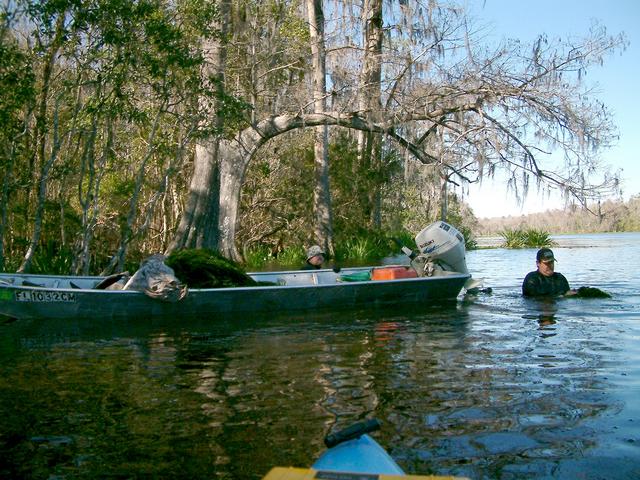Not far from the launch area I finally heard the sound of human voices. As I rounded a bend I saw these two Beefy Bubbas in the water doing something.
Turns out they were harvesting Brazilian elodea (Egera densa).
I chatted with them for a bit and found out they were from Cross City, about 100 miles south. They said they grossed about $250,000 a year wholesaling Elodea and kept four families employed in various aspects of the business.
These same two fellows also told me about the nesting Bald Eagle and Blue Spring.
The excerpt below concerns Elodea in Washington State, but gives one a good idea what a problem it is.
Brazilian elodea is a popular aquarium plant and can be found for sale in most pet shops, usually under the name Anacharis, although the sale of this plant in Washington is illegal.
The trouble starts when Brazilian elodea is accidentally or deliberately introduced into lakes and ponds. The characteristics that make Brazilian elodea a good aquarium plant, also make it a nuisance plant out of its native habitat.
Brazilian elodea forms dense monospecific stands that restrict water movement, trap sediment, and cause fluctuations in water quality. Dense beds interfere with recreational uses of a waterbody by interfering with navigation, fishing, swimming, and water skiing.
An estimated 1500 acre feet of storage capacity were lost annually in Lake Marion, South Carolina due to sedimentation caused by Brazilian elodea growth. In New Zealand, electric generating plants were shut down when fragments of Brazilian elodea clogged intake structures on the Waikato River.
In Washington State, local and state government and lake residents spend thousand of dollars every year to manage Brazilian elodea infestations. The cost of the control project in Silver Lake, Cowlitz County is over one million dollars!
Source: Access Washington
